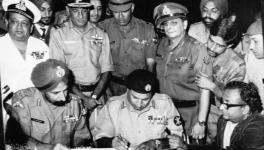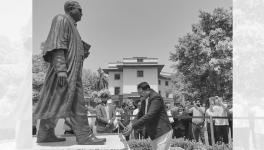Why it is Disingenuous to Equate Anti-Minority Violence in Tripura and Bangladesh
It is exactly a week since the first reports of attacks on Muslim-owned establishments and places of worship came out of Tripura. What purportedly began as a reaction to the anti-Hindu violence in Bangladesh during Durga Puja celebrations has now taken a life of its own and continues unabated, with more than a dozen mosques vandalised and numerous Muslim-owned houses pillaged and burnt to the ground.
The Bangladesh government reacted swiftly to the bigoted attacks on its minorities, jailing perpetrators by the hundreds. Bangladesh Prime Minister Sheikh Hasina quickly condemned the attacks and said that the perpetrators would be “hunted down and punished”. In a pointed remark, she added that actions on the other side of the border have a bearing on what happens in her country. “We expect that nothing happens there [in India] which could influence any situation in Bangladesh affecting our Hindu community here.” Her government also announced substantial compensation for those who suffered losses.
Human rights and civil society groups in Bangladesh came out on the streets protesting the atrocities against its Hindus. The country’s media ran stories and editorials denouncing the violence, advocating the need for the state to provide security to minorities.
The reaction in India to the violence in Tripura couldn’t be starker.
The PMO and HMO India Twitter handles have not sent a single tweet about the violence in Tripura. Prime Minister Narendra Modi and Home Minister Amit Shah have made several public appearances over the past week, but Tripura is yet to appear in their utterances. Tripura Chief Minister Biplab Deb’s Twitter feed over the past week is replete with photos of him attending rallies, sending birthday greetings, and sharing aerial photos from Shah’s Kashmir trip, but not a peep on the violence against Muslims in his state.
Leaders from the Opposition parties have also kept mum. The Congress duo of Priyanka and Rahul Gandhi, who showed extraordinary zeal to reach Lakhimpur Kheri to meet the families of the four murdered farmers, have shown no concerns for the Muslims of the northeastern state. Mamata Banerjee, whose party is looking to make inroads in Tripura, has also been silent on the plight of the near 10% of the state’s population.
The videos and desperate messages coming out of the state tell stories of a minority under siege and desperately pleading for protection from the authorities, but they have scarcely received any. Faced with the state’s apathy, they have taken it upon themselves to guard their properties. In a video posted on 27 October, a police officer is seen giving assurances to the Muslims of Dharmanagar in the North Tripura district. “We have controlled all the pickets, every mosque has been provided with a picket. If anyone of you have a problem, call the police we are here in your service and we are patrolling for you,” the official in the video says.
She curiously advises the group against guarding their mosque on the pretext that it creates problems for unnamed “other people”. “But if you come together like this and panic like this, the problem is escalating in the entire region. If you are protecting your mosques—even I believe in religion—it creates problems for other people.” One wonders if the focus of her attention would be better directed at those attacking her audience.
In his book, ‘Khaki and Ethnic Violence in India’, Omar Khalidi writes: “A docile and loyal police, acting on behalf of a corrupt and unscrupulous civilian authority, adds up to both no citizen protection at all and to the basic ingredients of police state.”
As if to prove Khalidi’s diagnosis, Tripura Police late Tuesday night sent out a series of tweets, assuring everything was hunky-dory in the state and, quite predictably, terming reports of ongoing arson “fake news”. “Certain persons by using fake social media IDs are spreading fake news/rumours on Tripura. It is informed that law & order situation in the State is absolutely normal,” read the first of four tweets.
Paul R. Brass, in his seminal study, ‘The Production of Hindu-Muslim Violence in Contemporary India’, writes that “the national leaders of the party [BJP] go to the extent of acknowledging that riots have been promoted at the local level by elements from their own party, and that, as L.K. Advani said to me years ago, ‘we know about’ these people, implying that they would cleanse them from the lower levels of the party as soon as practicable.”
Brass then quite ominously adds that riots in the Indian context have become routine politics: “Riots, therefore, first and foremost persist because they are unacknowledged and illegitimate but well-known and accepted transgressions of routine political behavior in India.”
The BJP has a penchant for anti-Muslim dog whistles. Its top leadership has brazenly described Muslim immigrants from Bangladesh as “termites”, the anti-CAA agitations as the work of violent protesters who could be “identified by their clothes”, and swept the Muslims of Uttar Pradesh under the blanket term “abba-jaan”, who gobble up all state subsidies.
For a dispensation keen to impress its Hindu vote base, nothing does the trick better than a show of impunity against Muslims. The videos from Tripura show mobs brandishing swords and makeshift weapons while shouting Hindu religious chants and anti-Muslim slurs as they roam rather fearlessly and unimpeded on the roads and streets of Tripura.
It all appears part of a tried and tested script; as Brass writes, “Incidents are provoked, processions are taken out, mass mobilisations are organised deliberately to offend the sensibilities of the other community’s members. Economic and political advantages are gained both from the tension and from the violence that sometimes follows such actions.”
While the BJP is likely hoping to reap a rich harvest from the state of affairs in Tripura and the opposition is keeping silent for reasons of unseemly realpolitik, the media’s silence appears perplexing. Despite most mainstream media houses becoming cheerleaders of the regime since 2014, there is at least the basic expectation from it to report the news, but even that belief seems misplaced. There is a near-complete silence, barring some cursory reports that just regurgitate the police or the vandals’ version of events, and no voices from the affected community.
Brass’s research elucidates that the media has historically played an important role at all stages of riots. He writes: “The media, especially the newspapers, play important roles at all stages in the production of riots, including the planning and rehearsal stages, the instigation of riotous activity, and the interpretation phase. In recent years, TV reporting on riots has also come in for some share of blame both for inciting violence, however inadvertently, and for publication of false and damaging news in the midst of riots.”
While the production and dissemination of false news in Tripura are limited to right-wing propaganda outlets and troll social media accounts, the mainstream media is unwittingly playing its part by repugnant elisions and evasions as the 4,00,000 Muslims of the state live under a veritable siege.
The institutionalised nature of the ongoing pogrom against the Muslims of Tripura, as evidenced by the reaction—or lack thereof—of all elements of the state machinery and civil society of the country, puts it in sharp relief to the anti-Hindu violence in Bangladesh. Any attempt to draw a parallel between the two will be an exercise in dishonesty.
The author is an independent writer. The views are personal.
Get the latest reports & analysis with people's perspective on Protests, movements & deep analytical videos, discussions of the current affairs in your Telegram app. Subscribe to NewsClick's Telegram channel & get Real-Time updates on stories, as they get published on our website.






















